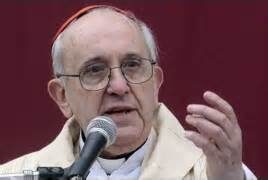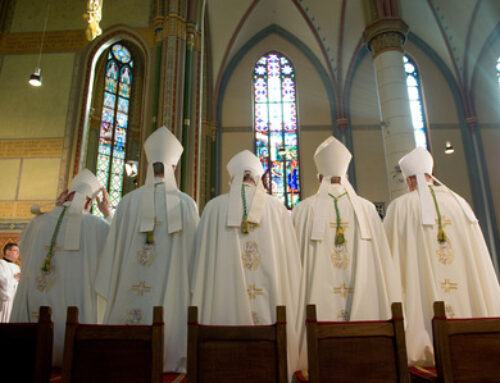
This essay concerns a different instance of contradiction. The issue is Pope Francis’ statement on same-sex marriage: “What we have to create is a civil union law . . . That way [homosexual couples] are legally covered. I [stand] up for that.” At the same time, Francis is on the record as opposing same-sex marriage.
Some say there is no contradiction here; in other words, that Francis is for a secular process but against a religious one. In fact, however, there is a contradiction, but it lies deeper. In supporting the civil union, Francis is acknowledging the normality, as well as the ethical acceptability, of homosexual relationships. And that acknowledgement contradicts Catholic teaching, which the Catechism states as follows:
“Basing itself on Sacred Scripture, which presents homosexual acts as acts of grave depravity, tradition has always declared that ‘homosexual acts are intrinsically disordered.’ They are contrary to the natural law. They close the sexual act to the gift of life. They do not proceed from a genuine affective and sexual complementarity. Under no circumstances can they be approved.” (Paragraph 2357)
Let me emphasize that I am not suggesting Pope Francis is wrong to dispute the traditional view of the Church on homosexuality. I am saying that he did so in the wrong way—by acting as if the Church had never spoken about the nature of homosexuality or the acceptability of any kind of union in which homosexual acts occur.
The proper way to dispute any teaching or belief—a way time-honored in philosophy, theology, and every other field of intellectual discourse—is to present one’s analysis of it thoroughly and in sufficient detail and depth to be persuasive.
In the case of civil unions for homosexuals, Francis should have explained exactly what he disagrees with in traditional Catholic teaching: Does he believe homosexual acts ARE NOT gravely depraved? ARE NOT intrinsically disordered? ARE NOT contrary to natural law? ARE NOT closed to the gift of life? ARE Sexually complementary? More importantly, he should have explained what evidence he has to support his position on the matter, including scientific evidence, scriptural evidence, and arguments offered by past and present scholars.
Francis’ attempt to preserve continuity in the Church’s view of same-sex marriage differs in one important respect from the papal efforts to preserve doctrinal continuity discussed in “Pope Francis’ Curious Encyclical.” In that case, the contradictions were obscured by combining mutually exclusive teachings. In this one, the traditional teaching that contradicts Francis’ assertion is simply ignored. Neither approach enhances the author’s or the Church’s credibility.
Could anything have preserved the Church’s credibility in this matter? Yes. Other members of the Magisterium could have respectfully and collegially called attention to Francis’ ignoring of Catholic teaching in his published statement. But as far as I can tell, that has not occurred. Instead, other prelates have remained silent, or issued statements that widely skirted the issue, or praised Francis’ for his Christian charity toward homosexuals. Bishop Gregory Parkes’ response is an example of skirting; Bishop Robert Barron’s, of praising.
Bishop Gregory Parkes created a short video to clarify what Pope Francis said in his recent statement. But rather than comment on that statement, the Bishop noted and described two paragraphs from the Catechism. First, Paragraph 1660, which says that marriage is between a man and woman for life and open to the generation of new life. Second, Paragraph 2358, which says that all men and women, regardless of sexual orientation, are children of God and are to be accepted with respect and compassion since we are all created in God’s image. The Bishop concludes by explaining that the Church does not address civil unions in its official teaching because they are a legal construct for defining legal right sand relationships; he also recommends the Catechism of the Catholic Church for more information.
Oddly, Bishop Parkes mentions Paragraph 2358, which commands us to love homosexuals as we love ourselves (an important reminder, to be sure) but he does NOT mention either Paragraph 2357, which defines homosexual acts as “gravely deprav[ed],” “intrinsically disordered,” “closed to life,” and “contrary to the natural law,” or Paragraph 2379, which requires homosexuals to practice chastity. Nor does he address the most disturbing part of Francis’ remarks—his approval of same-sex civil unions.
Bishop Robert Barron begins his ten-minute video by stating that Francis was misrepresented by the media as “a revolutionary, maverick pope leading a recalcitrant institution” into the world. He points out that Francis defined himself as “a sinner who has been looked upon by the gaze of Christ.” And that, Barron says, describes us all: “We have been addressed by grace.” He emphasizes that the Pope wants us “keep our priorities clear,” because “the Church is not a little chapel for the morally perfect” but instead a community that “gathers in the whole world.” He then quotes Francis: “The Church sometimes has locked itself up in small things and in small-minded rules.”
Barron adds that it is a mistake to lead with ”rules or rule books”; we must lead with the idea that Christ has saved us. In other words, Barron explains, Francis is not saying, “let’s jettison the rules” but instead is engaging in “prioritization and pastoral strategy.” The media, he claims, misses the fact that Francis is dealing with the “spiritually wounded,” and those “adrift in the sea of moral relativism,” who have “lost their way, lost their [home] address.” This Barron calls the “great issue” Francis is addressing, in contrast to the smaller ones of rules.
Barron admits that sometimes Francis gives the impression that he sees traditional Catholics—for example, those who are pro-life—as small-minded people who should be “thrown under the bus,” but claims that Francis doesn’t really intend to be saying that. Barron concludes by saying it is a good thing that Francis didn’t make his statement in an encyclical but did so in a less formal, more personal way, because the result is a “very powerful articulation of what stands at the very heart of the Catholic thing [sic].”
Bishop Barron is a brilliant, highly accomplished scholar, a fact that makes his video all the more disappointing. Much of what he says is wise, notably putting first things first (such as Christ’s gift of grace) and responding with compassion to the “spiritually wounded.” What is troubling is what he glosses over. For example, after admitting that Francis seems to regard traditional Catholics as small-minded and concluding that Francis doesn’t mean that, he then moves on without offering any evidence for that conclusion. A more significant example is Barron’s reference to Francis’ remark on “small things” and “small-minded rules.” The obvious questions are, What small things? What small-minded rules? Is the Church’s traditional teaching on homosexuality one of them? What is small-minded about that? Bishop Barron does not acknowledge any of these questions, even though he surely could have found time in a ten-minute video to do so. Nor does he venture anywhere near the implications of Francis’ approval of same-sex civil unions.
The failure of these and other prelates to respond meaningfully to Francis is most lamentable because many Catholics consider Francis’ views on same-sex unions a profound personal insult. That reaction is not because they lack Christian charity toward homosexuals. It is, rather, because Francis evidently feels considerably more sympathy and compassion toward homosexuals than he does toward the generations of heterosexual Catholics—that is, billions of married couples—who were taught by the Church that:
1) The main purpose of sexual intercourse is procreation.
2) Every act of intercourse must be open to the possibility of pregnancy.
3) Deriving too much pleasure from the sex act with one’s spouse is a venial sin and even, in some cases, a mortal sin.
4) If “natural planning” does not work for a couple, their only recourse is to refrain from having sex.
5) Those who practice artificial birth control must refrain from receiving the Eucharist.
6) Unless users of birth control pledge to stop using it, they are to be denied absolution in the confessional. (This is true even of women for whom another pregnancy poses serious health risks.)
No one can begin to calculate the physical and emotional suffering these teachings caused Catholic married couples, or the number of parents of large families who could not feed and clothe their children adequately, or the number of marriages that ended in divorce when limitations on physical intimacy destroyed the spouses’ emotional and spiritual intimacy.
I said that generations of Catholics received those teachings (past tense). I should add that Church’s teaching on contraception, as expressed in the Catechism, has not changed.
With that unchanged teaching still vivid in their minds, married Catholics suffered a new assault on their faith in the Church a decade or so ago. They learned then that at the very same time Catholic doctrine was effectively denying them the joy of spontaneous sexual union, and in some cases requiring them to remain chaste, many priests were enjoying homosexual pleasures with other men and even, in some cases, with children. Moreover, many prelates were committing the greater sin of ignoring or condoning the behavior of those priests.
The pain and resentment those Catholic laypeople felt has certainly not been diminished by Francis’ latest expression of sympathy for homosexuals or by priests’ and prelates’ praise of Francis’ statement as testimony to love of neighbor. Those laypeople are more likely to have a different scripture passage in mind, one with specific application to Pope Francis and his fellow bishops in the matter of marriage:
“ . . . If you are presenting your offering at the altar, and there remember that your brother has something against you, leave your offering there before the altar and go; first be reconciled to your brother, and then come and present your offering.” (Matt 5: 23-24)
And what exactly is that application to the hierarchy? The Catholics I have described would no doubt answer as follows:
Surely the obligation of seeking reconciliation with our neighbors is greater for the powerful than for the powerless, for leaders than for followers, and greatest of all for those entrusted with the spiritual as opposed to the material, welfare of others. For centuries the Catholic Magisterium have burdened married couples with restrictions on the intimacies associated with the Sacrament of Marriage. Billions of Catholics around the world have borne that burden, including the parents of the prelates who approved it. Now Pope Francis, with the expressed or implied assent of the Magisterium, has given tacit approval to homosexual acts that mock and desecrate the physical expression of love ordained by God for the married. Having acted as they did, Francis and his assenting fellow bishops should follow Jesus’ command in Matthew by acknowledging that they have profoundly insulted their married brothers and sisters and seeking reconciliation with them.
And what actions would qualify as a genuine effort at reconciliation? The following, perhaps among others:
Either affirm the Natural Law view of sexual intercourse or abandon it, and in either case apply the Church’s position logically. Affirming it would mean that acts of homosexual intercourse are against nature and disordered, therefore always immoral; whereas acts of heterosexual intercourse are natural and ordered, therefore moral (within the context of marriage). Abandoning it would mean, for example, that all sexual acts, between a man and a woman, or two men, or two women are moral if performed in the context of a committed, loving relationship.
Make the Church’s teaching on marriage reflect its Natural Law teaching. If the Church continues to hold homosexual acts to be by nature immoral, it should disapprove of both civil unions and religious unions for homosexuals. (It may, of course, in the interests of fairness and kindness, advocate that hospitals and nursing homes treat homosexual “partners” as family members for the purpose of visitations.) If, in contrast, it regards all sexual acts as moral, it should approve of civil unions and marriage for homosexual and heterosexual couples alike.
Acknowledge that affirming civil unions for homosexuals entails affirming the moral legitimacy of homosexual intercourse. Such affirmation would not simply give homosexual intercourse the same legitimacy as heterosexual—it would treat homosexuals more favorably because not one of the six rules for heterosexuals noted above would apply to homosexuals. While heterosexual couples would remain heavily burdened, homosexuals would bear no burdens at all.
Free heterosexual couples from all burdens that homosexual couples do not bear. Even speaking of doing this gives rise to a serious dilemma. On the one hand, doing it would require disavowing the theological view expressed in Paul VI’s Humanae Vitae and widely regarded as an infallible teaching. (Others attribute that encyclical to an atmosphere of fear and confusion at the time, as well as questionable pressure from certain members of the Magisterium on the Pontiff.) On the other hand, not to do this would constitute a grievous injustice to heterosexuals.
The contradiction in Catholicism about homosexual unions, like that concerning private property (see “Pope Francis’ Curious Encyclical,” Parts 1 and 2), does grave harm: It defies logic, mocks truth, cripples insight and wisdom, destroys credibility, and undermines faith. Moreover, those who ignore it or attempt to rationalize it away diminish themselves and injure the Church. May the Holy Spirit grant the Magisterium the humility and courage to purge it from their teachings.
Copyright © 2020 by Vincent Ryan Ruggiero. All rights reserved



